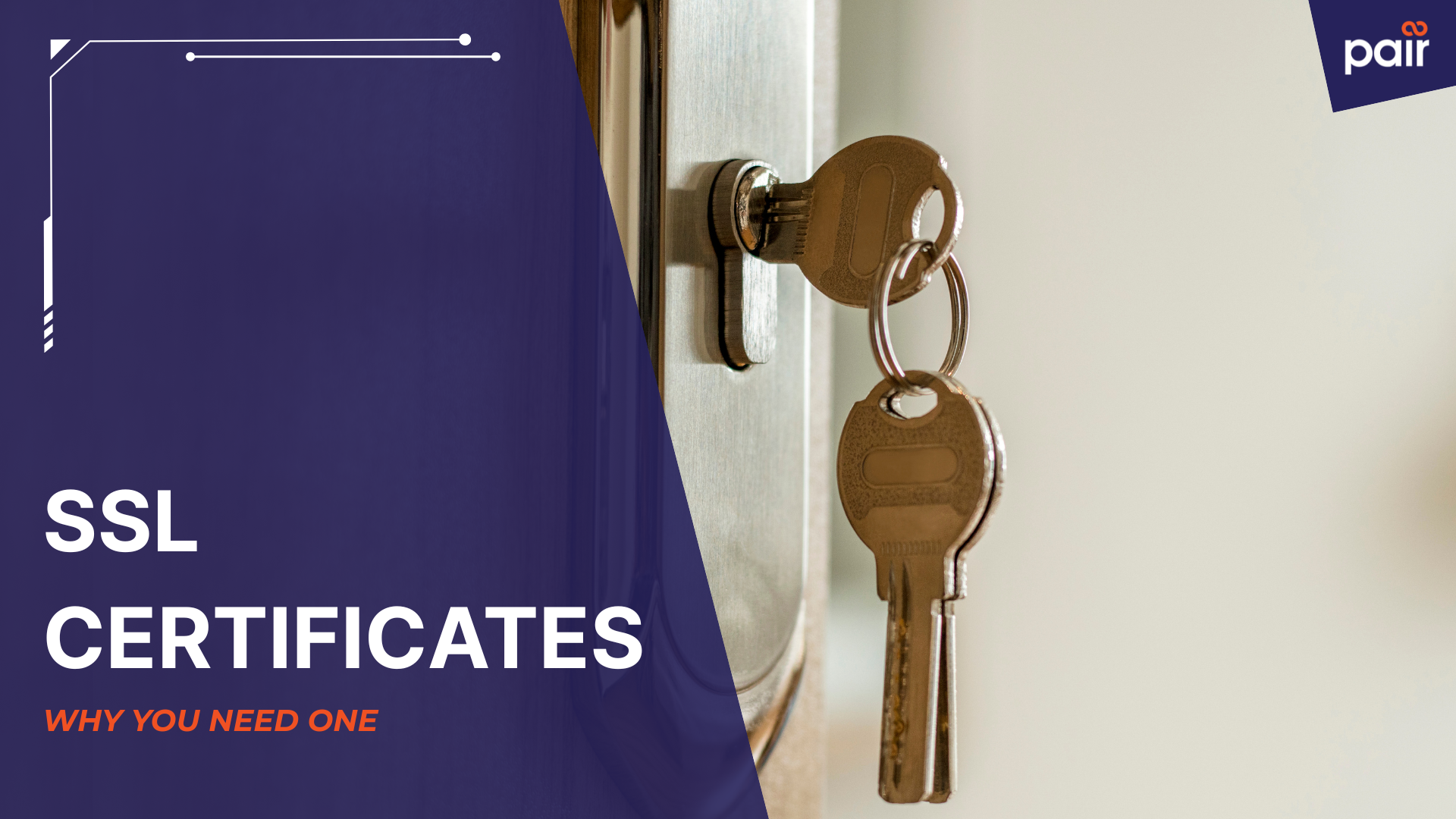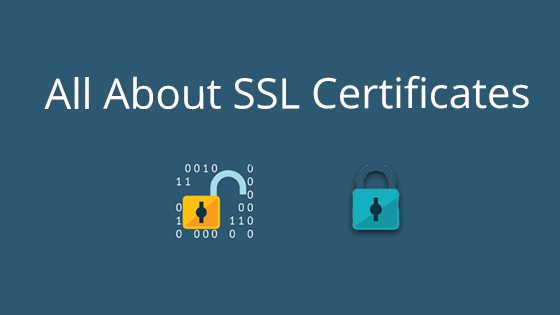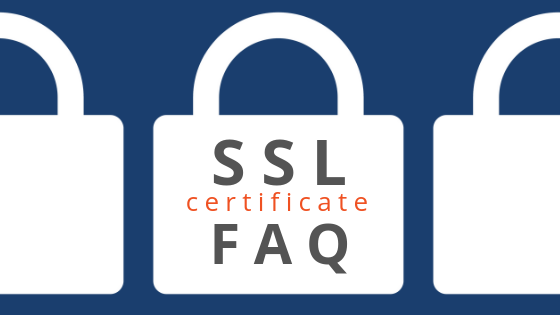Have you ever clicked through to a website only to have your browser taken over by a warning saying the page isn’t secure? You probably left immediately and went to a more reputable site. Well, potential customers are probably doing the same to your site if it doesn’t have a Secure Sockets Layer (SSL) certificate
That tiny padlock in the browser bar? It’s not just decoration. It’s proof that your site is protected by SSL. SSL certificates encrypt the data exchanged between a user’s browser and your web server. Without that encryption, information like passwords or credit card details can be intercepted in transit.
So when you see https:// instead of http://, that’s SSL quietly doing its job—keeping your visitors’ data safe and your site’s reputation intact.
Why SSL Still Matters (and Not Just for E-Commerce)
SSL isn’t optional anymore.
Google now requires websites to use HTTPS if they want to appear in search results. Chrome, Safari, and Firefox all mark non-secure sites as “Not Secure.” The result? Users bounce, and trust evaporates.
Even if your site doesn’t process payments, SSL signals professionalism and authenticity. It shows you care about privacy—something users expect by default in 2025.
And there’s an SEO benefit, too. Search engines prioritize secure sites, meaning SSL isn’t just protection—it’s optimization.
How SSL Certificates Actually Work
When a visitor connects to your site, their browser and your server perform a quick digital handshake. Think of it like two people agreeing on a secret language before speaking.
Here’s what happens behind the scenes:
- The browser requests a secure connection.
- Your server presents its SSL certificate.
- The browser checks if the certificate is valid and signed by a trusted authority.
- If everything checks out, both sides establish an encrypted channel.
That’s it—milliseconds of cryptography that keep hackers from eavesdropping.
Different Types of SSL Certificates
Not all SSL certificates offer the same level of validation. The difference comes down to how much background checking the certificate authority does before approving it.
The three main types of SSL certificates are:
- Domain Validated (DV): Fast and simple. Verifies only that you own the domain. Ideal for blogs, portfolios, or internal sites.
- Organization Validated (OV): Confirms your domain ownership and business existence. Requires some documentation, but builds more visitor trust.
- Extended Validation (EV): The highest level of verification. Confirms your domain, your company, and your legal identity. EV certificates trigger the most visible browser trust indicators—often used by banks and major online stores.
Setup speed decreases as validation increases, but trust rises accordingly.
Domain Coverage: How Many Sites Does One Certificate Protect?
You can secure a single domain—or go broader.
- Single-Domain Certificates: Cover just one domain, such as example.com.
- Wildcard Certificates: Protect one domain and all subdomains (like blog.example.com or shop.example.com).
- Multi-Domain Certificates: Secure multiple distinct domains (e.g., example.com and mybrand.org).
Each option trades convenience for cost and complexity. The broader the coverage, the more validation typically required.
Pair Networks Makes SSL Easy
Here’s the good part—you don’t have to manage all this manually.
When you host with Pair Networks, you get free SSL certificates for your domains through Let’s Encrypt, the industry-trusted authority. Certificates renew automatically every 90 days, no manual steps required.
Need extra support or a longer-term option? Pair also offers PairSSL, starting at $18.99 per year. You’ll get:
- Fast setup from within the Account Control Center
- Automatic renewals
- 24/7, year-round support from real humans
You can order an SSL certificate and manage everything right in your Account Control Center:
- Log in at my.pair.com
- Click Security → Manage Your SSL**
- Enable Let’s Encrypt for free, or order PairSSL with just a few clicks
Simple. Secure. Set-and-forget.
**If you’re using the Legacy interface, follow the instructions above. If you’re using the New ACC interface, see our Ordering an SSL Certificate article for instructions.
Why Some Paid Certificates Still Matter
Paid SSL certificates sometimes include warranties—financial coverage from the certificate authority if something goes wrong. Think of it as insurance for very high-stakes sites.
If your business handles sensitive data or compliance-heavy transactions (like healthcare or finance), a warranty-backed certificate offers an extra layer of reassurance.
PairSSL, for example, is backed by Comodo’s certificate warranty, giving you both encryption and peace of mind.
SSL in 2025: More Than Just a Padlock
SSL has evolved from a nice-to-have into a bare minimum for modern websites. But it’s also part of your brand’s credibility and SEO strategy. Visitors might not understand the encryption math—but they feel the trust it builds.
And trust, ultimately, is what drives engagement and sales.
Whether you’re launching a small blog or running an online store, SSL is your first step toward building a safer, more visible website. Pair makes it effortless—with free Let’s Encrypt SSLs or affordable PairSSL certificates you can activate in minutes.
Explore Pair’s web hosting plans to get started and keep your visitors secure.
Frequently Asked Questions About SSL Certificates
Do I really need an SSL certificate for my website?
Yes. Every website needs SSL in 2025—whether it’s selling products, collecting emails, or just sharing information. Without it, browsers warn visitors that your site isn’t secure, and Google may lower your rankings. Following SSL best practices protects your visitors and your reputation.
Does SSL improve SEO?
It does. Google confirmed HTTPS as a ranking signal years ago, and that still holds true. Sites with SSL certificates often rank higher and load without browser warnings, improving both search visibility and user trust.
What’s the difference between free and paid SSL certificates?
Free SSL certificates, like those from Let’s Encrypt, encrypt data effectively and work well for most personal or small business sites. Paid SSL certificates, like PairSSL, often include warranties, extended validation, and hands-on support—ideal for e-commerce or professional organizations.
How can I tell if a website is using SSL?
Look for a padlock icon next to the URL in your browser’s address bar, and check that the URL starts with “https://.” That “s” stands for “secure.” If you click the padlock, you can view details about the certificate.
How do I install an SSL certificate with Pair Networks?
If you host with Pair, it’s simple. Log in to your Account Control Center, go to Security → Manage Your SSL, and either enable Let’s Encrypt for free or purchase PairSSL for $18.99/year.** Installation and renewals happen automatically.
**If you’re using the Legacy interface, follow the instructions above. If you’re using the New ACC interface, see our Ordering an SSL Certificate article for instructions.




